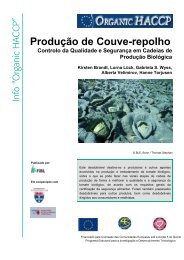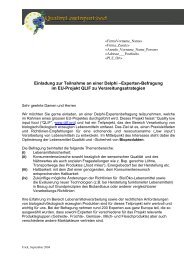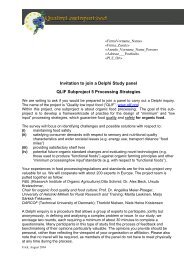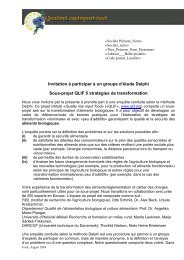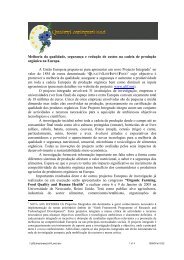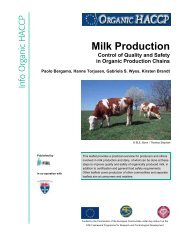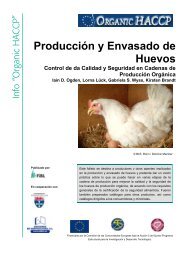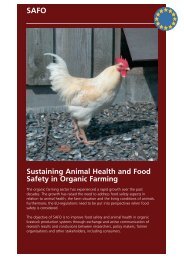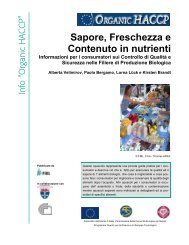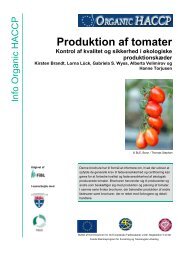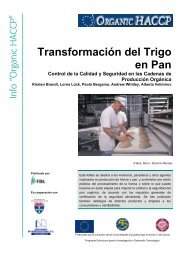ORGANIC SEED PROPAGATION: CURRENT STATUS AND ...
ORGANIC SEED PROPAGATION: CURRENT STATUS AND ...
ORGANIC SEED PROPAGATION: CURRENT STATUS AND ...
You also want an ePaper? Increase the reach of your titles
YUMPU automatically turns print PDFs into web optimized ePapers that Google loves.
ENVIRFOOD<br />
FP6-2003-SSA-1-007003<br />
Deliverable 4<br />
Switzerland recognizes that they are not a breeders’ nation anymore. They have an organic<br />
(as well as conventional) seed production nearly only for main field crops: wheat, rye, barley,<br />
spelt, Triticum monococcum and potatoes there are Swiss certified seed production in farmers<br />
cooperatives providing nearly 100 % of organic seed supply. Price difference from<br />
conventional is moderate. Seed for other field crops and all the vegetable crops’ seed are<br />
imported. Price difference from conventional is high to very high.<br />
Sweden is almost self-sufficient considering organic seed of wheat, winter rye, triticale, pea<br />
and broad bean. They are self-sufficient in some extent for oat, barley, potatoes, winter rape,<br />
timothy, meadow fescue, alsike clover and red clover. Considering horticultural crops there is<br />
enough seeds on the market, but most of them are imported.<br />
In Denmark there is sufficient Danish produced seeds of most species that is possible to<br />
produce in Denmark. But especially vegetable seeds are not produced organic in Denmark.<br />
They also have problems producing sufficient amounts of white clover, lupine, and pea. But –<br />
taking into account very wide research work performed in Denmark (I have mentioned several<br />
examples above in this paper) it is believable that Denmark will solve their deficiency<br />
problems in near future.<br />
In Norway double certified organic seed is not produced in sufficient level. They import<br />
some grass seed.<br />
In Finland situation is good with reference to some species – oat, barley, spring wheat, spring<br />
rape, red clover and timothy. Organic seed of other species are not produced sufficiently.<br />
There are 6 Belgium seed suppliers and 1 Dutch seed supplier registered now in official web<br />
site of Belgium www.organicXseeds.be. Agriculture in Belgium depends a lot from imports<br />
when speaking about conventional seed supply as well as about organic. For instance,<br />
vegetable seeds are imported from the Netherlands, maize – from France, grass and clover<br />
seeds from Denmark and the Netherlands.<br />
Not all demand of organic seed is self-assured in Austria, too. For instance, they import<br />
vegetable seeds; not all wanted varieties are propagated in Austria, too.<br />
There are not legal problems to use so-called ‘home saved seed’ in organic<br />
farming. It is allowed in all 8 countries, replying to my questions, to use home saved seed.<br />
Farmers are stimulated to test quality of such seed, but mainly there are not official data about<br />
the samples tested, and officials are of the opinion that farmers do not test home saved seed<br />
very usually or that testing mainly depends from specific farmer (Sweden, Denmark,<br />
Norway, Finland, Austria). Chris Dybvad from Norway remarks that it is illegal to market<br />
seed if it is not a ‘certified seed’.<br />
Kris De Rider told that for home saved seed Belgium applies the EU Regulation 1768/95 and<br />
they have as well a national legislation about this subject, too. EU Regulations do not exclude<br />
use of home saved seed.<br />
Klaus-Peter Wilbous reported that it is allowed to use home saved seed in Germany, but<br />
farmers are not allowed to sell or change it to other farmers, but only use it on their own farm.<br />
This issue plays a certain role in cereals and a few other crops, but not in vegetables. Only<br />
few of the farmers who are saving their own seed do seed quality test on a regular basis (e.g.<br />
bio-dynamic farmers).<br />
Andreas Thommen from FIBL told that home saved seed is very rarely used in Switzerland<br />
neither by conventional nor organic farmers. Most of them use official certified seed. But the<br />
organic guidelines are not an obstacle to use home saved seed. If an organic farmer produces<br />
his own seed, he fulfils the seed production guidelines and therefore his seeds would be<br />
organic.<br />
7




